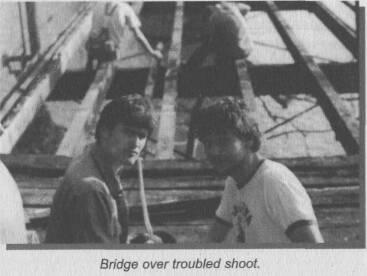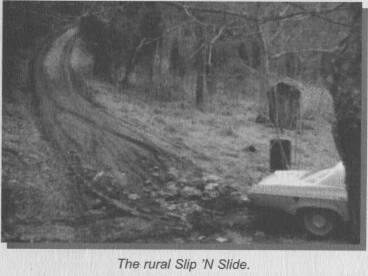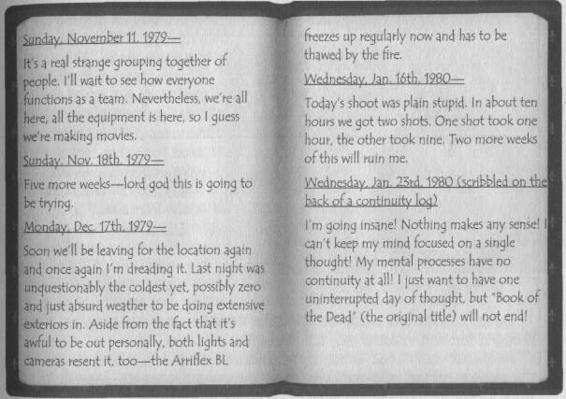If Chins Could Kill: Confessions of a B Movie Actor (21 page)
Read If Chins Could Kill: Confessions of a B Movie Actor Online
Authors: Bruce Campbell
Tags: #Autobiography, #United States, #General, #Biography & Autobiography, #Biography, #Entertainment & Performing Arts - General, #Entertainment & Performing Arts, #Actors, #Performing Arts, #Entertainment & Performing Arts - Actors & Actresses, #1958-, #History & Criticism, #Film & Video, #Bruce, #Motion picture actors and actr, #Film & Video - History & Criticism, #Campbell, #Motion picture actors and actresses - United States, #Film & Video - General, #Motion picture actors and actresses

The food was laid out on card tables, buffet style, and ringed two large rooms. I tried to taste a little of everything, but this was physically impossible -- the sweet potato dishes alone came in five varieties.
Events like this tended to bring out the best of the South. You would be hard-pressed to find a single family in other parts of the country that would so willingly and happily prepare a veritable feast for seventeen people they didn't know, or even
like
for that matter.
I'm including moonshine under the category of "fun," but that was debatable. Mr. Holt introduced us to its charms after weeks of constant prodding.
"C'mon, Gary, you gotta get us some! Ya gotta!"
"Y'all sure you want me to?" he'd warn. "It ain't fer kids, this stuff..."
"Aw, phooey! We're from Detroit!"
The moonshine that Gary produced didn't really make you drunk. It was too powerful for that -- it made you
crazy.
Gary explained that to test a batch of "shine," you'd pour some into the lid of the mason jar (the only true receptacle) and light it on fire. If it burned a soft blue flame, it was good stuff, but if it burned an orange color, you'd better pass -- it was most likely distilled in a car radiator.
Armed with "shine," one night we decided to go clubbing. In the small burg of Morristown, we had to adjust our big-city expectations. The place Gary steered us to was small, really small -- okay, downright clandestine. Across the dim room, we saw a smattering of Southern belles and I knew I had to get something going.
Brazened by a gut full of home-brewed nitroglycerine, I approached a girl and offered what I thought was a unique line.
"Pardon me, ma'am (we learned to say
sir
and
ma'am
a lot down there), but have you ever danced with a Northern boy before?"
The woman rolled her eyes, but stood up and offered her arm.
"No."
With that, we stumbled to the dance floor. As drunk as I was, I think she actually had a head start on me. We'd dance a step or two, fall to the dance floor, help each other up, attempt to dance again, and go right back down.
Helping her up for the umpteenth time, I detected a pleasant odor.
"Excuse me, ma'am, but what's that lovely scent you're wearing?"
"Ivory Soap," she explained, as if I were a moron, and promptly collapsed.
A DEEP AND DARK DECEMBER
By the end of November, winter was in full swing. Later, we found out that Tennessee had logged one of the harshest winters in recent memory, while Michigan posted a positively balmy one.
The muddy driveway to the cabin froze, rendering this difficult-at-best road impassable by car. The daily "long march," lugging equipment and food down the quarter-mile, slick road became positively gulag-like. At the beginning of the shooting day, gravity was our friend. At the end of a sixteen-hour day, the last thing you wanted to do was haul equipment up that rural Slip 'N Slide.
The cabin, lacking any hint of insulation whatsoever, became astoundingly cold inside. A roaring fire and two space heaters didn't seem to help any. Under duress, I developed a theory about personal comfort that dogs me to this day. I reasoned that it was better to keep myself in a mild state of
dis
-comfort, rather than give in to the false impression of warmth provided by the space heater. By mid-December, I had sworn off any "external" heat source and preferred instead to shiver uncontrollably.
Equipment, as well as personnel, began to freeze. On the seventeenth take of an exterior dolly shot, the synchronization cable (between the camera and the sound recorder) froze and we were forced to go inside and let it thaw by the fire. As weeks rolled on, this problem became kind of moot because the
camera itself
would freeze.
WHEN IN DOUBT, "SHEMP" IT
By late December, our original termination date, actors and crew members began to leave in droves. Prior commitments to "real" jobs, or school made it impossible for some to stay.
Tim Philo, the director of photography, had to return to Wayne State University in early January. That was all well and good, but Tim had borrowed our main camera, the Arriflex BL, from their film department, and it was his responsibility to return it.
Sam, as captain of this sinking ship, could never allow that to happen.
Sam: But Tim, without the BL, we don't have a backup camera.
Tim: Okay, but if I leave it, you promise not to use it?
Sam: Absolutely.
Tim hadn't been gone five minutes when Sam turned to Josh.
Sam: Josh, unpack the BL.
Other cast and crew members simply had enough. Faced with this, we were forced to employ an old Super-8 trick: "Shemping."
Being fans of the Three Stooges growing up, we discovered that their shorts of about twenty minutes in length were filmed two or three at a time -- thereby capitalizing on sets from the big, Columbia A pictures, currently in production. It allowed them, for example, to use a large castle set (and shoot a pie fight or something) before it was torn down. As a result, they often shot overlapping scenes from different shorts.
One day, Shemp (the really ugly one with long, stringy black hair) had a heart attack and the rest of the Stooges, distraught as they were, had to finish off scenes from several shorts.
To do this, a "fake Shemp" was brought in. The double, actor Joe Raima, was the wrong height and weight and lacked the true Shemp mannerisms. Even as teenagers watching the Stooges after school, we could tell whenever the
fake
Shemp made his appearances (which amounted to four shorts) and it amused us to no end.
We then began to use the term "Fake Shemp" for any actor in our Super-8 flicks who didn't have any lines, or was doubling for someone else, (which seemed to happen a lot when you couldn't pay actors to stay around). With
Evil Dead,
we decided to elevate "Shemping" to an official, on-screen credit category mainly because they soon constituted the bulk of our cast.
Former film student, Kurt Rauf, was a monster leaping into frame. Super-8 starlet, Cheryl Guttridge, allowed us to cover her with peat moss in Sam Raimi's garage for a dramatic, out-of-the-grave lunge. Sam's brother, Ted, did his best to imitate a pair of tentative feet, shuffling across a blood-strewn floor. Local Tennessee actress, Barbara Carey, endured many nights of wigs, latex applications and broken fingernails to play the long-departed Betsy Baker. Dorothy Tapert, Rob's sister, spewed blood during a reshoot in a suburban Detroit basement. Even Rob, Mr. Producer, donned a monster wig and doubled for Ellen Sandweiss.
The term Shemp has since expanded in our vocabulary to include much broader applications:
Shempish
-- anything that is cheesy or second-rate -- "Man, throw that shirt out, it looks really Shempish."
Shemping
-- doing nothing of any importance -- "I have no plans Saturday night, I'm just Shemping..."
Shemp Alert
-- sighting a Shemp; being "Shempish."
THE DOG DAZE
The month of January began to take on a
Lord of the Flies
feel. We were now a full month over schedule. Gone were the days of zany antics -- we had entered the darkest, oddest days of the shoot.
To kick things off, a "fogger" fire nearly burned our entire woods down. These hand-held, portable fog machines ran off electricity and relied on a volatile oil-based substance to create the clinging mist you see in horror films. The effect was great, but foggers tended to spit flames every so often. Tall, dry grasses surrounded the cabin and created a recipe for disaster. Next thing we knew, a fire appeared out of nowhere and only a mad stomping session put out the conflagration.
When you get tired, you become careless and lose the ability to sense danger. Late one night, after securing a light, Josh jumped down from the rafters and impaled his foot on a sharp, upturned spike. He yanked his foot off the nail, dragged himself over to a couch and curled up into a ball. For the next several days, we'd peek into his room before shooting and see how he was doing.
"Josh, are you coming to the set today?"
"... No."
"Okay..."
Josh's diary, kept faithfully, chronicled the collapse of our youthful enthusiasm:






